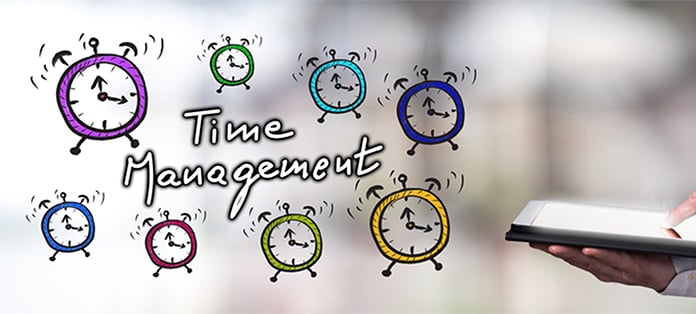Too many attorney-clients, too many cases? A nice problem to have, but you might be asking “Where does the time go?” In this blog five Certified Legal Nurse Consultants will inspire you to ask two even more important questions: “How do I manage time?” and “How do I manage myself to grow my legal nurse consulting business?” Use their strategies to refine your own time management mastery.
- Prioritize specifically. I often make a list with times on it when I’m overwhelmed with work. For example:
8:00am: Read medical records for Smith case (2 hours)
10:00am: 10 minute walk
10:15am: Chronology for Jones case (3 hours)
1:15pm: Lunch
2:00pm: Conference call with attorney, John Davis
2:30pm: 10 minute walk
2:45pm: Work on locating experts for Stevens case (1 hour)I know this seems extreme to some, but this process keeps me on track. If I need to make changes along the way, I’m flexible. I always allow a couple of times during the day to get up and walk and move around. I try to stand and stretch hourly.
- Reevaluate your legal nurse consulting plan each morning. I plan a week ahead, but obviously, other things come up and I make adjustments to match the new demands.
- Communicate with attorney-clients. Communicate priorities and time lines so you can organize yours.
- Utilize CLNC subcontractors. This is important when your case load causes you to feel overwhelmed or when the case is outside of your specialty.
- Make to-do lists. I make separate lists for my personal life and my CLNC business. I keep the business list in my office by the computer and update it weekly. It’s refreshing to be busy enough to write things down. It is also neat to see what I have accomplished in the past week. I have a notepad with my to-do list right on my desk so that I can add to it the minute something pops into my mind.
- Maintain your phone calendar. We all carry our phones and wouldn’t leave home without them. If I’m asked to meet an attorney-client or pick up a case, I can consult my calendar and see when I’m free. I still struggle with remembering to look at my phone for the week’s events and appointments. However, I wouldn’t want an attorney-client to call to discuss a legal nurse consultant job when I’m unprepared or not expecting the call because I forgot to calendar it.
- Stay organized. My office may not be the neatest, but the business files in my computer are very organized. I have Excel spreadsheets to keep up with mileage, expenses, invoice and payment logs and cases. In my case log, I have columns for the case name, the attorney-client’s name, date of contact and date of injury. I also have a column for the marketing strategy that led to the attorney-client hiring me. For example – referral from another attorney, previous case with the attorney, exhibiting at a legal conference, LinkedIn, the Internet or the NACLNC® directory. The last column is for the disposition of the case. Did it settle? Did I testify? Did I give a deposition? When is the trial date? Was the case dropped because it was not meritorious?
- Review and recheck open cases and invoices regularly. I review cases that are open to be sure there isn’t something left undone. Is there another CLNC service that I can offer to the attorney-client that is relevant to this case? I recheck invoices. I write up an invoice as soon as I finish working on a legal nurse consultant job. One time I realized I had not billed for work I had done a year earlier – I did get paid, but I had some explaining to do. That experience taught me to check, check and double check my invoices.
- Purchase online. I don’t always have time to run errands. That is valuable time that I could use to work on a case. I order products (birthday gifts, contact lenses, prescriptions, and office supplies) online so that I don’t have to drive to the store, make a selection, stand in line and then drive back home. I also save money by not buying stuff I don’t need.
- Start out the day with a to-do list. Prioritize the list and include what you want to accomplish for your legal nurse consulting business. I may not accomplish everything on my list that day, but it helps keep me organized and focused.
- Turn off email. It’s a major distraction and big consumer of time. I check my email when I begin working, mid-morning, once in the afternoon and when I wrap work for the day. I started closing email after being repeatedly diverted from a project one day. When I stopped working and looked at my to-do list, I realized I had accomplished very little. The only exception is if I am actively communicating with an attorney-client.
- Document case progress. Keep a running list with dates and the attorney-client’s name of all cases and projects in process. This strategy helps me have an overall picture of my workload.
- Screen your calls. I normally don’t answer calls from friends while working. Chatting on the phone cuts into the workday. It’s amazing how many people think just because you work from home, you can socialize anytime.
- Avoid household chores. When I first started working as a Certified Legal Nurse Consultant, I would try to get a few household chores done during the day. I stopped doing that because it was too easy to see other things that needed to be done. Before long, I would be away from my desk for several hours. It finally dawned on me that if I wasn’t working from home, I would not be able to do laundry, dishes, etc. Now I don’t feel compelled to get things done around the house.
- Set aside work hours. I actively plan to work on my legal nurse consulting business during set business hours. This allows me time to plan other activities and not feel overwhelmed. I answer emails and make phone calls related to my CLNC business during work hours. I schedule phone calls with my attorney-clients during these times and make it clear what times I’m available. If I’m not expecting a phone call in the evening I often let it go to voicemail. I value my attorney-clients and their time, but I also value my time. A specific case helped me recognize that not keeping regular work hours was a mistake. I allowed it to monopolize my free time and family time. I answered phone calls and emails all hours of the day and evening. I figured out pretty quickly that this doesn’t work for anyone. Boundaries are a very healthy addition to your life. It forces you to diversify your energy and ultimately allow you to be more productive. There are weeks that I work outside of my scheduled time due to work load or deadlines, but not very often.
- Organize the chart review process to streamline your analysis. My first case arrived via email. I opened the obstetrical case and began sifting through the enormous volume of records. I read every page from start to finish; it took me days. Finally, when I reached the delivery note and summary, I found the essence of the case. News flash! I should have started there and saved myself so much time. Now I read the delivery note first, the fetal monitor tracings second, labor and progress notes third and prenatal record last. This process organizes the information in a manner that makes sense to me. I take notes during my review, noting page numbers and paragraphs as needed. I write why this is important to the case so when I go to compile my review, referencing the records is a snap and I know what I was thinking at the time.
- Create folders. I create a file folder for my cabinet, a file folder in my email and a file folder on my desktop for each attorney-client. I place all written correspondence and invoices directly into the relevant folder for easy review. I move all emails into the email folder and any electronic records for the case to the desktop folder. The desktop folder is where I put authoritative research pertaining to the case, my written records and notes. I have a folder in my cabinet with articles, practice bulletins and continuing education I’ve completed according to topic. If I find a really great article on electronic fetal monitoring I save it in a folder marked “Electronic fetal monitoring” so that when I need to reference it on a future case it’s easily accessible.
- Manage family, friends and neighbors. Most of my time management challenges initially had to do with outsiders who felt that if I was home, I could also stop to chat whenever they came to the door or called on the phone. The first thing I learned to do was to protect my time with a sign on the front door that says, “At the office. Please return after 5:00pm.” Our neighbors are all great people, but until I posted the sign they didn’t respect my time spent in a home office. They did, however, respect the sign.
I mute the home phone, the office line and my cell phone when I start work each day. If the phones are with you, you can always hear or feel them vibrate. A couple of relatives never wanted to believe that the “Please don’t call during work hours” applied to them. Two of them would call every phone number in a repeated cycle until I finally gave up and answered. (There was also a disconnect between what they – and I – considered a true emergency call).
One other thing that seemed to carry weight in terms of protecting my home office work time was the day I was asked and finally disclosed to relatives what my company grossed annually. Evidently, the figure was considerably more than they had assumed, and the importance of my work zoomed proportionately. From that point on, they found it entirely convenient to hold their calls until after 5:00pm, including weekends. Who knew?
– Dale Barnes, RN, MSN, PHN, CLNC
– Marcia L. Bell, RN, BSN, CAPA, CLNC
– Jane Hurst, RN, CLNC
– Rebecca Jones, RN, MSN, CNM, CLNC
– Camille Joyner, RN, BSN, CCM, CLNC
Thanks to the CLNC Pros for sharing these 18 legal nurse consulting time management strategies. Now that you’ve read these 18 strategies it’s time to assess your own time management mastery and add the strategies you need to grow your legal nurse consulting business.
Success Is Yours!
P.S. Comment and share which legal nurse consulting time management strategies you need to implement now.








